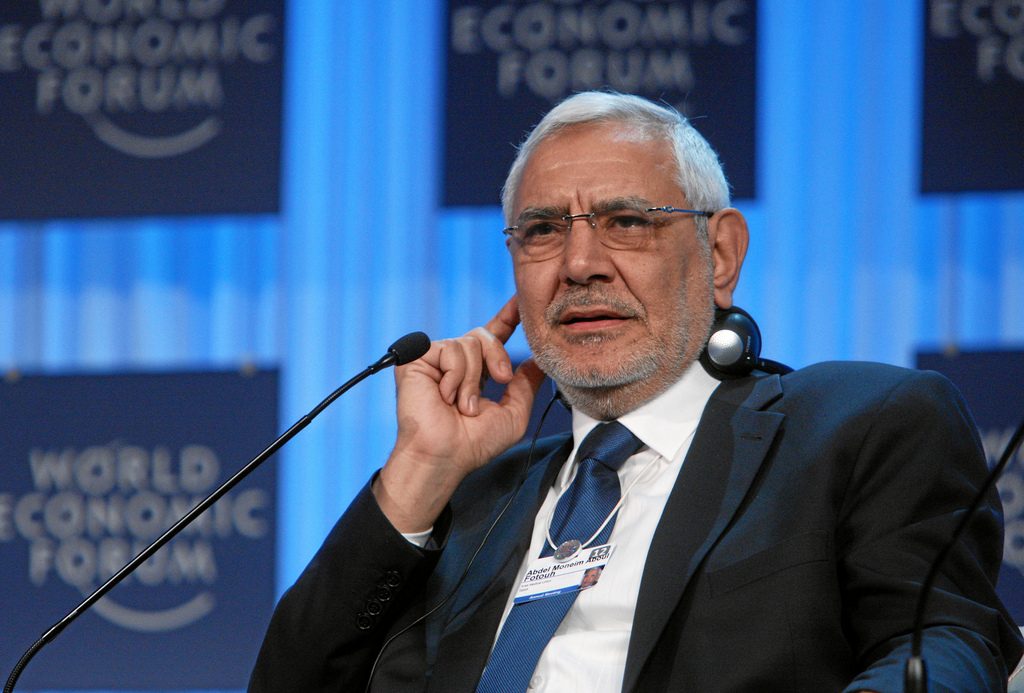
On the eve of Mubarak’s departure, Al-Jazeera :
April 2012, Al-Jazeera :
April 2012, Al-Mehwar: “The Muslim Brotherhood is my precious home that I am honored to belong to… I would only resign if I decide to run for the presidency. However, this resignation would be an administrative and not an ideological one, as no one can change his principles and ideologies.” said Abdel Moneim Aboul Fotouh, a leading MB figure and a possible presidential candidate.
May 2012, CBC:
June 2012, Aboul Fotouh’s presidential campaign:
March 2013, Conference at Gharbeya governorate of Egypt:
During the first 18 days of the uprising, Aboul Fotouh adopted the MB’s cautious discourse, maintaining a balance between supporting the revolution and declaring respect for some leading figures affiliated with the former regime, namely Omar Suleiman and Ahmed Shafiq. This balance would secure a gain for the MB in both cases. They would be perceived as a key revolutionary actor if the revolution succeeded in toppling Mubarak, while they would survive a violent suppression if the Mubarak regime was able to contain and end the revolution.
After the fall of Mubarak, in a move emulating the Brotherhood’s own pursuits of its self-interests, Aboul Fotouh announced his intention to run for the presidential elections. The Brotherhood and its political arm, the Freedom and Justice Party, were quick to quell any rumors that they would support Aboul Fotouh’s presidential bid.
Despite not receiving the backing of his own former Brothers, Aboul Fotouh bridged the gap between a curious combination of supporters. Coming out 4th in the presidential race, Aboul Fotouh was able to gain the trust of voters from across the political spectrum. Islamist Parties, including hard-line conservatives like the Nour Salafi Party, Al-Wasat Islamist Party, the Salafi Calling, and Building and Development Party abandoned the Brotherhood candidate and chose instead to endorse Aboul Fotouh. At the same time, Aboul Fotouh managed to secure the votes of liberal and leftist figures as Wael Ghonim, activist and founder of the We Are All Khaled Said Facebook page, and Hassan Nafa’a, a professor of political science at Cairo University.
How could professors of political science, prominent political activists, and Islamist groups agree on one presidential candidate out of 13? While it remains unclear why Aboul Fotouh was able to attract the support from across Egypt’s political and ideological spectrum, it may be attributed to his ever changing stance – a self-described Salafi, Muslim Brother, and a liberal Islamist, at various points of his career.
Despite coming out 4th in the 2012 presidential elections, this apparently disappointing result might be in Aboul Fotouh’s own favor after all.
Throughout the past two years, Aboul Fotouh has managed to portray himself as a pro-revolution figure, as well as a moderate Islamist, a friend of Salafis, or a liberal. Backing Shafiq would have destroyed this image, and would have turned him into an anti-revolution figure, eliminating the diverse support he managed to secure. On the other hand, backing Morsi could possibly garner Aboul Fotouh the support of the FJP in the future. Whether a conscious decision on Aboul Fotouh’s part, Morsi’s victory would also prove to expose the latter’s failure to face the storm of Egyptian challenges.
At this point, our moderate warrior returns to the scene, calling for early presidential elections. Should early elections actually be held, Aboul Fotouh would have a better chance of winning, due to the continued support of Salafis, provided they are unable to field a popular and more conservative candidate. The current rift between Salafis and the FJP would result in them resorting to Aboul Fotouh, who they supported in 2012 presidential elections. Some liberals and leftists disappointed with the National Salvation Front’s lack of achievements could also sway in Aboul Fotouh’s direction. A pervading sense of disappointment with leading NSF figures could also translate into support for Aboul Fotouh, as a last resort for those who prefer an allegedly moderate Islamist over a radical one such as Hazem Abu Ismail. MB and FJP supporters disillusioned with the group’s failure to resolve any of Egypt’s major problems, would likely gravitate towards Aboul Foutouh as well, as an increasing number of FJP youth who respect him.
This brings us to an essential question: Should we trust Aboul Fotouh if he were to run for the upcoming presidential elections (be it in one month or three years)? The answer can be found in his very own quotes at the beginning of this article.
Fady Salah is an Egyptian writer, journalist, political analyst, and author.
Photo: WEF
Image: Aboul%20Fotouh%20WEF.jpg
